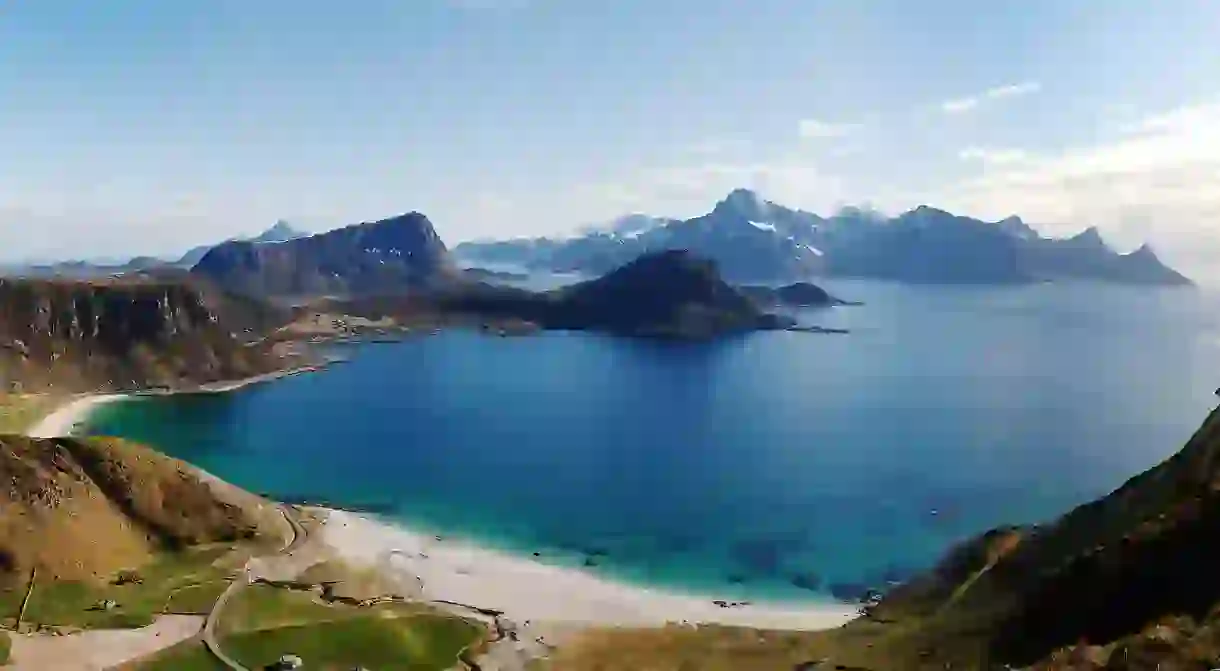An Essential Guide to the Lofoten Islands in Norway

Situated north of the Arctic Circle in the turbulent waters of the Norwegian Sea, the Lofoten archipelago is a little-known paradise of unspoilt, untamed nature, small fishing villages and majestic mountains. Reachable by train, bus, ferry or flight, the islands make for the perfect destination for those looking for fresh sea air, ancient culture and a part of Europe quite out of the ordinary.
Lofoten’s climate is surprisingly mild for its northern location with average winter and summer temperatures of -1°C and 12°C respectively (34°F and 54°F). Norway is located on the same latitude as Siberia and Greenland, but is considerably warmer thanks to the delightful influence of the Gulf Stream, and with its off-coast location, Lofoten is a particular beneficiary. What’s more, its geographical position makes it the perfect place to experience not only the Northern Lights between September and April, but also the midnight sun around June and July. Remember to bring an eye mask in the summer as the constant light can cause trouble sleeping.

The islands of Lofoten are well-known within Norway for their amazing scenery – high praise indeed, given the amazing landscapes in the rest of country. They lend themselves to exploration, whether on foot, in a kayak or diving into the depths of a fjord. A large network of hiking trails in the mountains offers spectacular views and opportunities for all levels of hiking experience, while a little closer to earth, you can partake in kayaking and RIB-safaris (RIB is short for ‘Rigid Inflatable Boat’, like a dinghy on steroids). These tours are a great way to get to know some of Lofoten’s most treasured inhabitants; the thriving white-tailed eagles which can be spotted scouting for prey almost every day. If you’re lucky, you may also spot a flock of orcas going about their day. The islands feature some of the world’s northernmost surfing sites, and they are counted amongst the best in Norway.

Unsurprisingly given their location and flourishing wildlife, the islands have a long and proud fishing history. Many old fishing villages are still settled in today, and one of the area’s specialities are their ‘rorbu’, charming old fishermen’s cabins, some of which have been converted into little guesthouses. If you’re looking for an authentically old-school Lofoten experience, the icing on the (fish) cake should be stockfish (tørrfisk), a Norwegian dish consisting of air-dried cod which dates back to at least the 12th century.
An even more ancient, authentic experience can be found at the Lofotr Viking Museum. In the late 1980s, archaeologists excavated what turned out to be the largest Viking building ever found in Norway, an 83-metre (91-yard) chieftain’s high seat dating back more than a thousand years. A full reconstruction of the hall a stone’s throw from the original has been joined by a reconstructed smithy, ships and other structures brought to life by reenactment and feasts which you can take part in. There is also an opportunity to visit the original indigenous people of Norway, the Sami, in the local area.

Although the Lofoten Islands are remote, there are a surprising number of ways to get to them. Flights go directly from all major Norwegian cities to Bodø Airport, Harstad/Narvik Airport, Svolvær Airport, Leknes Airport and Røst Airport, and Norwegian also has direct routes to some other European destinations, such as Harstad/Narvik to Gatwick and Alicante. The ferry, Hurtigruten, takes passengers down the west coast of Norway. There are also busses and trains which can take you as far away as Stockholm. Public transport on the islands mainly runs along the main road, the E10, so if ‘off the beaten track’ is the goal, then renting a car or going with a guide is the way to go.













